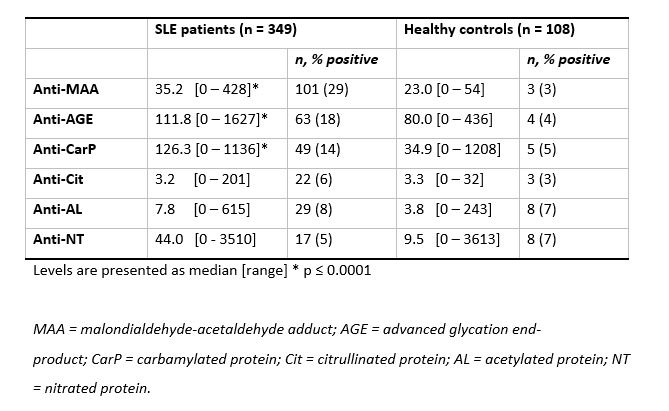Session Information
Session Type: Poster Session D
Session Time: 8:30AM-10:30AM
Background/Purpose: Systemic lupus erythematosus (SLE) is a heterogenous autoimmune disease characterized by a global loss of self-tolerance. Although autoantibodies are an important hallmark of SLE, many autoantibodies are not specific for SLE or for a specific SLE manifestation. Post-translational modifications (PTMs), including citrullination and carbamylation, have been studied extensively in rheumatoid arthritis and antibodies against these PTMs are associated with disease progression. While PTMs have also been detected in SLE patients, studies on the presence of anti-PTM antibodies and the relation to clinical aspects remain limited.
Methods: IgG antibody responses against six PTMs (malondialdehyde-acetaldehyde adducts (MAA), advanced glycation end-products (AGE), carbamylation (CarP), citrullination (Cit), acetylation (AL) and nitration (NT)) were tested using enzyme-linked immunosorbent assays in sera of SLE patients and compared to 108 healthy controls. Serum of SLE patients visiting the neuropsychiatric SLE (NPSLE) clinic of the Leiden University Medical Center between 2007-2019 was used. Levels and positivity of anti-PTM antibodies were correlated with clinical features and SLE manifestations.
Results: 349 patients with SLE were included in this study: 87% female and a mean age of 44 ± 13 years. Anti-MAA, -AGE and -CarP antibodies showed significantly higher positivity in SLE compared to controls, as shown in Table 1 (all p ≤ 0.0001). Anti-MAA and anti-AGE antibodies both correlated with clinical and serological measures associated with SLE, including complement consumption (low C3/C4) and Systemic Lupus Erythematosus Disease Activity Index (SLEDAI-2K). Patients with major NPSLE showed higher positivity of anti-MAA antibodies (39 vs 24%, p = 0.007) and anti-CarP antibodies (20 vs 11%, p = 0.042) compared to patients without NPSLE.
Conclusion: SLE patients have anti-PTM antibodies against MAA, AGE and CarP modified proteins. Interestingly, anti-MAA antibodies clearly associate with major NPSLE, a clinical condition for which virtually no biomarkers exist.
 Table 1 Prevalence of antibodies against specific post-translational modifications in patients with systemic lupus erythematosus (SLE) and healthy controls
Table 1 Prevalence of antibodies against specific post-translational modifications in patients with systemic lupus erythematosus (SLE) and healthy controls
To cite this abstract in AMA style:
Monahan R, van Beukel M, Borggreven N, Kloppenburg M, Huizinga T, Steup-Beekman G, Trouw L. Malondialdehyde-acetaldehyde Antibodies Occur in Systemic Lupus Erythematosus and Associate Specifically with Neuropsychiatric Involvement [abstract]. Arthritis Rheumatol. 2021; 73 (suppl 9). https://acrabstracts.org/abstract/malondialdehyde-acetaldehyde-antibodies-occur-in-systemic-lupus-erythematosus-and-associate-specifically-with-neuropsychiatric-involvement/. Accessed .« Back to ACR Convergence 2021
ACR Meeting Abstracts - https://acrabstracts.org/abstract/malondialdehyde-acetaldehyde-antibodies-occur-in-systemic-lupus-erythematosus-and-associate-specifically-with-neuropsychiatric-involvement/
